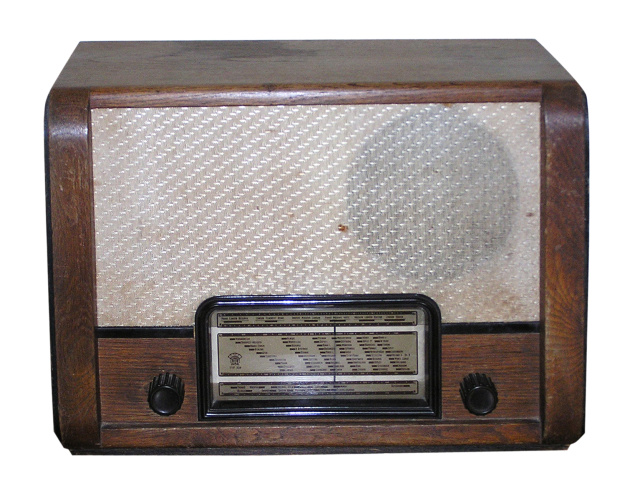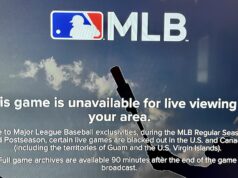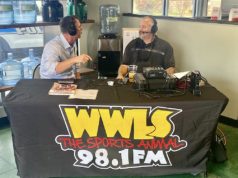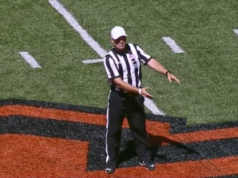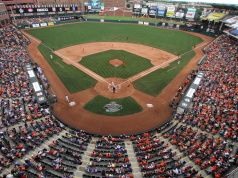While trying not to text in my car Sunday evening, I furiously scanned local FM and AM radio stations.
To my dismay, Game 5 of the 2015 World Series apparently was not broadcast in the OKC radio market.
This used to be a hell of a good country.
“What does this say about our nation and our city?” I yelled at my windshield. Again, I was trying not to text people.
I kept scanning the dials:
“Get your free skinny shots by calling …”
“No, I’m definitely not proud of that fact. I’m not proud of having to hide it from my kids…”
“Because of their suffering, they’ve lost their inner strength. This, of course, made them vulnerable to all kinds of sins!”
It was all blather. Could this really be happening, I wondered? Could the culmination of America’s sporting pastime really be locked out of the most basic airwaves?
In a busy municipality that wants to call itself a Big League City, we appeared not to have room on the radio for the World Series.
Sure, the Thunder were also smoking the Denver Nuggets at home that night, but OKC radio has more sports stations than Oklahoma has female senators.
I checked WWLS 98.1 FM. Thunder postgame. I checked WWLS Alternate 640 AM. Same thing. I checked 107.7 The Franchise. Nope. Franchise Alternate 1560 AM? Zilch. I checked KREF 1400 AM. General nonsense. I checked KGHM 1340 AM. National jibber jabber. I tried 105.3 KINB. Pure bloviation.
By that point, I had reached my destination, which might as well have been the end of my wits. I had texted no one, but I had scanned the AM/FM radio spectra twice, hearing dozens of pious sermons and gunny sacks of sports yak.
And no World Series.
Now, the reason I didn’t hear any World Series action is (of course) complex, but I’ll lay it out to the best of my ability and understanding.
Essentially, sports radio stations have contracts with national broadcasting companies. The Franchise is with NBC. 105.3 The Pro is with CBS. The Sports Animal has ESPN. 1340 AM The Game is Fox affiliated.
While the World Series television broadcast was on Fox, the radio rights to the 2015 Series were apparently ESPN property. That meant WWLS the Sports Animal (98.1 FM / 640 AM) seemingly had both balls in its hand but only chose to broadcast one.
But it’s not quite that simple.
According to a source with knowledge of the Sports Animal’s flagship contract with the Thunder, WWLS is required to broadcast its Thunder coverage on both its FM and AM signals.
In essence, the Sports Animal’s mutual Thunder and ESPN contracts prevented the listening public from hearing a World Series victory for the second-closest MLB team to Oklahoma.
That’s absurd, and, in case you were wondering, the Kansas City Royals won their first title since 1985 by scoring five runs in the top of the 12th inning to beat the New York Mets.
(For the record, it’s possible that WWLS flipped to the last part of the World Series after completion of the Thunder postgame show, but by that point I was no longer driving and cannot confirm.)
Sad state of media landscape
So is this the sad state of baseball affairs in Oklahoma City? Is there not enough joy here in Mudville for local stations to work together and make sure the World Series is broadcast?
Perhaps this speaks less to public desires and more to the awkward corporate landscape of radio these days. This Business Insider charticle addresses media conglomeration as a whole, but it highlights the change in radio since 1995, when the FCC “forbade companies from owning over 40 stations.”
The 2012 piece notes Clear Channel owned 1,200 stations at the time, though the company reorganized and changed its name to iHeartMedia in 2014.
Cumulus Media, Inc., meanwhile, owns the Sports Animal and about 460 other stations nationwide.
But none of that speaks to the national broadcast contracts that often hamstring local stations’ options. The complexity of it all is likely lost on an otherwise-occupied public. After all, it’s only radio, right?
Radio, of course, was the first medium for any sport broadcast. Before radio, people crowded around theatrical scoreboards to keep up with the World Series in the 1910s.
Then, in 1921, KDKA in Pittsburgh became the first radio station to broadcast a baseball game, and in 1939, a Brooklyn Dodgers game became the first to grace a television.
Fast forward 90-some years, and MLB-team TV deals are often worth $6 billion or so (each) these days. The best MLB players sign contracts worth upwards of $20 million per year, and a select few make $30 million.
Meanwhile, everyone else’s wages in America have been falling, an easy reminder that not everyone has a satellite in his or her car.
So perhaps it’s fitting that the masses couldn’t even listen to the championship of America’s supposed pastime on OKC radio. Legal jargon, advertising rates and corporate policies all conspired against the consumer. That’s hardly #BreakingNews.
“All I have at home is a radio,” said a stranger who heard me grumbling about the topic Sunday night.
But he and I both had cell phones.
“If we download the ESPN app,” I said. “I’m sure they’ll send us text-message updates.”
Even while we’re driving, folks.
(Correction: This post was updated to correct a typo regarding the last time the Kansas City Royals won the World Series.)









